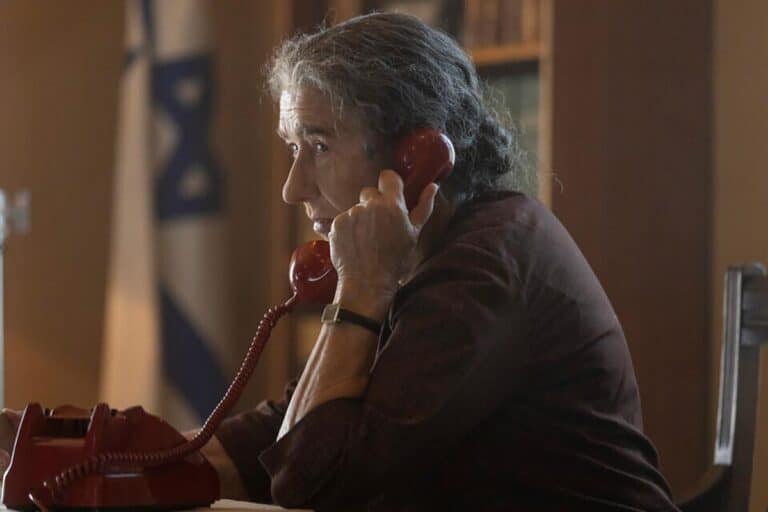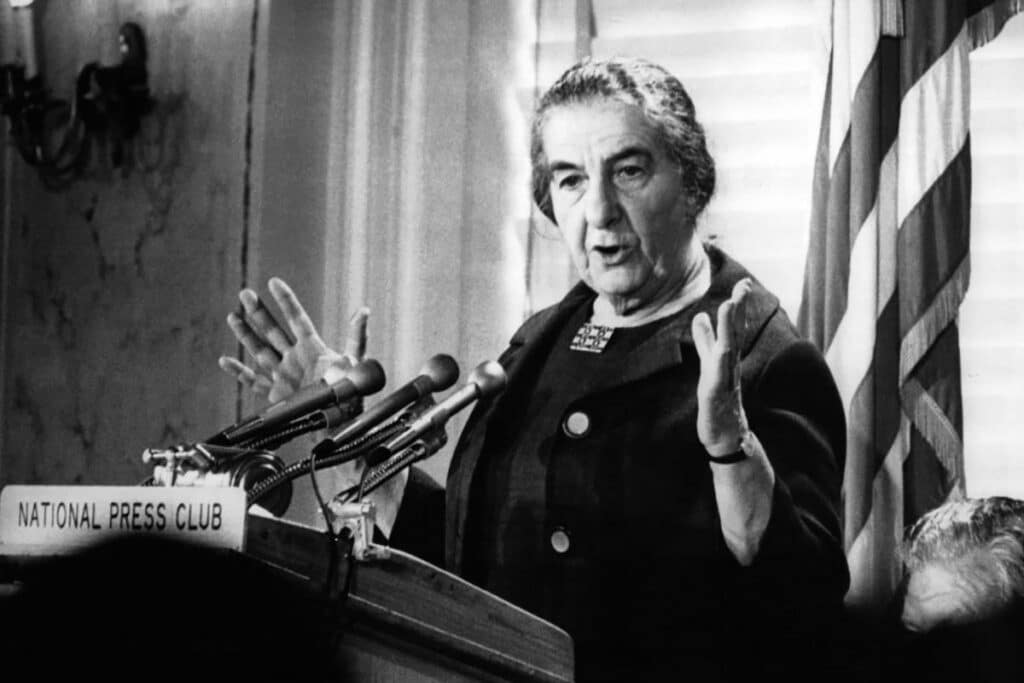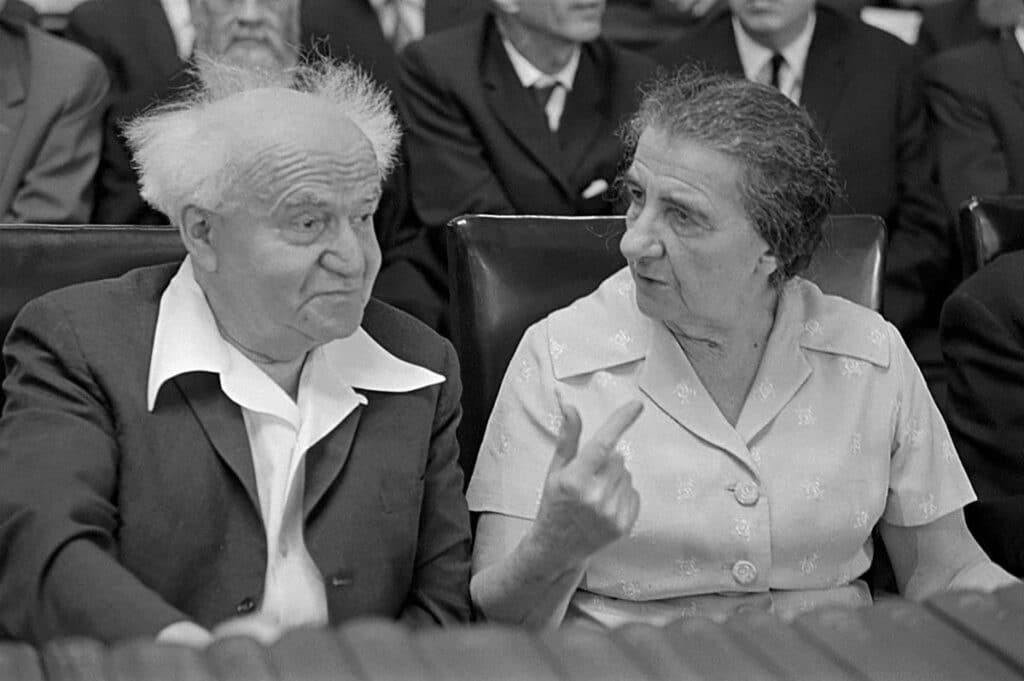
Golda Meir, Israel’s only female prime minister, is a celebrated yet controversial figure.
Meir is lauded for founding a powerful labor union and championing Israel’s National Insurance Act of 1954, which created social welfare programs for all Israelis. As labor minister, she supervised the building of over 200,000 homes, hundreds of new businesses and dozens of new roads.
However, her tenure wasn’t without controversy. Many critics focus on the Yom Kippur War in 1973. They criticize Meir for allegedly dismissing early warnings from her military advisers about an imminent surprise attack by Egypt and Syria.
This oversight, they argue, led to the deaths of 2,656 soldiers — a toll that, according to some experts, could have been mitigated had Israel acted preemptively.
“Golda,” which was released in theaters this past Friday, follows Meir as she leads Israel during the 18 days of the Yom Kippur War and the aftermath of the violence.
Unpacked spoke with Nicholas Martin, the screenwriter and a producer of “Golda,” about what inspired him to take on the project, Helen Mirren’s performance as the iconic leader, and the message he hopes the film will convey about Meir’s legacy.
Martin thinks criticism of Helen Mirren’s casting is unfounded
“Golda” faced scrutiny for casting the non-Jewish Helen Mirren as the Israeli prime minister. Critics argue that the role should have gone to a Jewish actress, asserting that only they could understand the unique challenges faced by Jews. The film’s creative decision to use a prosthetic nose for Mirren’s portrayal further fueled accusations of “Jewface.”
Read more: Should non-Jews play Jewish roles in Hollywood?
As historian David Perry recently argued, “Any non-Jewish person putting on a fake nose in order to portray a Jew [regardless of their actual appearance] is colliding with a grim history. Images of Jews with big noses have been associated with some of the most virulent anti-Jewish stereotypes since the later Middle Ages.”
Mirren herself acknowledged the criticism of her casting as “utterly legitimate.” When asked about the criticism, Martin emphasized the importance of authenticity over Mirren’s identity.
“It’s really simple. I just ask, ‘Do you think she did a good job? Is she a convincing Golda? Is she a good actress? Do you believe that she inhabited Golda?’ I would say she has very much so,” Martin said.
He argued that defining casting based on race, religion, or ethnicity restricts creative potential. Such a criterion would have disqualified him from writing “Golda.”
“I worry that the envelope of creative possibility is getting smaller and smaller,” Martin said. “I think there’s a fundamental question of freedom of expression.”
In addition, he noted, some Israelis have posited that only an outsider, someone not entrenched in the local dynamics, could tackle such a nuanced and sensitive subject.
“The irony is that many Israelis have said to me, ‘You are an outsider. As a non-Israeli, you are probably the only one who could have written this,’” Martin said.
However, many push back against this kind of thinking. In a Guardian op-ed, David Baddiel, the author of “Jews Don’t Count,” wrote:
“This issue is not really about who gets the work. It’s about the idea that minority experience should be expressed by those who truly know it, rather than caricatured by those who don’t. It would be an interesting conclusion, given 2,000 years of persecution, that the representation of Jewish identity doesn’t deserve this complexity.”
Martin spent years learning about Golda Meir to prepare to write “Golda”
Martin, a British writer who is not Jewish, felt drawn to tell Meir’s story as he observed the intensity of discussions about the Israeli-Palestinian conflict among his friends.
“I realized that I didn’t really know anyone that actually knew anything about Israel, and I certainly didn’t. So I thought if I’m gonna have to join in these conversations, I better learn something,” Martin said.
As Martin researched the history of Israel and the Middle East, he frequently encountered references to Meir. He remembered her from his childhood — Martin was 10 when the Yom Kippur War took place — and felt inspired to tell her story.
After co-writing the 2016 film “Florence Foster Jenkins,” which depicted the life of “the world’s worst opera singer,” Martin felt uniquely equipped to profile Meir. He believed his experience in writing about older women would help him secure a renowned actress for the role.
In his pursuit to make the film, Martin approached Meir’s grandson, Shaul Rahabi, for permission. During their discussions, Rahabi asked Martin if he saw any parallels between the amateur soprano and Meir.
“Florence famously sang the worst concert at Carnegie Hall and was delusional, and Golda raised enough money to equip an army, was the ambassador to the Soviet Union and fought a war,” Martin said.
However, Martin acknowledged to Rahabi the underlying similarities. “They both had a dream and they both went for it. They both were heroic in very different ways, but they both wanted to do something with their lives. It just happened that one of the things was ridiculous and one of the things was extraordinary,” he said.
Martin’s deep-dive into Meir’s life and legacy
To authentically capture Meir’s experiences surrounding the Yom Kippur War, Martin took five trips to Israel. He visited key sites where the conflict unfolded and consulted experts on both the war and Meir’s life, including the remaining members of her family who had known her.
His vision for the film took shape through these experiences. “It became obvious, to me at least, that the Yom Kippur War was the apotheosis of her life, the moment that I wanted to really explore,” he said.

In the course of his research, Martin frequently came across accounts of Meir’s remarkable composure during the Yom Kippur War. Former government officials depicted her as a resolute leader, anchoring the war room. They recounted how she functioned on minimal sleep and sustained herself with almost 25 cups of coffee daily throughout the war.
“Golda understood that the world was a tragic place. However, she also believed that if she were going to do anything positive with her life, she had to accept that and find hope and inspiration. All of her life experience came to the forefront and she was able to use her experience to guide Israel through that period.”
Presenting a nuanced image of Israel’s Iron Lady
In crafting the screenplay, Martin sought a nuanced portrayal of Meir that went beyond the familiar public persona. He wanted to show both the significant challenges she faced and her genuine warmth, wit, and kindness.

She grappled with the weight of leading a nation at war, yet she never let it erode her humanity, Martin said.
However, alongside her gentler attributes, the film doesn’t shy away from capturing her steely resolve, crucial for a wartime leader. In one powerful scene, Meir declares that if the IDF could encircle the Third Army, she would have her hands around Sadat’s throat. When asked if she would annihilate the 30,000 conscripts of the Egyptian army she intended to surround, Meir responds with a chilling, “people need to believe that I will,” and they believed her.
“Golda” aims to influence a different perception of Meir
Today, nearly 50 years after the Yom Kippur War, opinions on Meir remain polarized. The film challenges the notion that Meir was chiefly to blame for the war’s initial setbacks. Martin said he hoped viewers “will reassess Golda, see more of the complexity of the situation and maybe see a different narrative.”
Despite intelligence indications of a possible strike from Egypt and Syria, Meir, based on the assessments and advice of her military experts, did not order a full-scale mobilization. Israel’s military intelligence, under then-director Eli Zeira, misjudged the likelihood and timing of an Arab attack.
In the war’s opening hours, Israeli positions along the Golan Heights and Suez Canal were overwhelmed by the surprise attacks, leading to significant losses.
Although the Agranat Commission did not officially blame Golda Meir for the Yom Kippur War’s initial failures, the public’s dissatisfaction with its conclusions influenced her decision to resign.
A title card at the film’s end declares: “Her legacy of saving her country from annihilation leading to peace serves as her memorial.” Martin hopes to amplify this message and believes that people should reevaluate Meir’s role in the war and the criticism she faced.
“Golda” spotlights the flawed reports and advice Meir received from her military and intelligence advisors. While the film stops short of placing blame on Zeira or then-Defense Minister Moshe Dayan, it sheds light on how they contributed to the wartime setbacks.
“I hope that people see her for the inspirational, extraordinary, brave, and clever and charming woman that she was and that her place in the pantheon of leaders will be recognized,” Martin said.
Martin weighs in on the summer’s second Jewish double-feature showdown
On August 25th, on the heels of Barbenheimer, movie-lovers were treated to both “Golda” and Adam Sandler’s new Netflix comedy, “You Are So Not Invited to My Bat Mitzvah,” starring Sandler’s daughters Sunny and Sadie and Idina Menzel.
When asked which film to prioritize for a movie day, Martin made a pitch for his own.
“I’d suggest starting with ‘Golda.’ It’s a tough movie. It’s a film about a war, a tragic moment, and a woman at the end of her life who has to make some terrible decisions. I would go with that first so you could enjoy the Adam Sandler movie after.”
Read more
Originally Published Aug 28, 2023 10:00PM EDT


